THE101: Shangri-La Hotel - Case Study on Hospitality, Tourism & Events
VerifiedAdded on 2023/04/24
|9
|2120
|142
Case Study
AI Summary
This case study report provides an in-depth analysis of Shangri-La's operations within the hospitality, tourism, and event industries. It delves into the company's history, current practices, and its interactions with tourism and event agencies. The report examines the socio-cultural, economic, and environmental trends impacting Shangri-La's business, including economic pressures, environmental awareness, and socio-cultural shifts. It highlights strategies adopted by Shangri-La to respond to these trends, such as service adjustments based on economic growth, sustainability initiatives like urban beekeeping, and a focus on ethical and community-responsible practices. The analysis concludes that external environmental trends significantly influence Shangri-La's performance, necessitating adaptive strategies to maintain a competitive edge in the dynamic hospitality landscape.
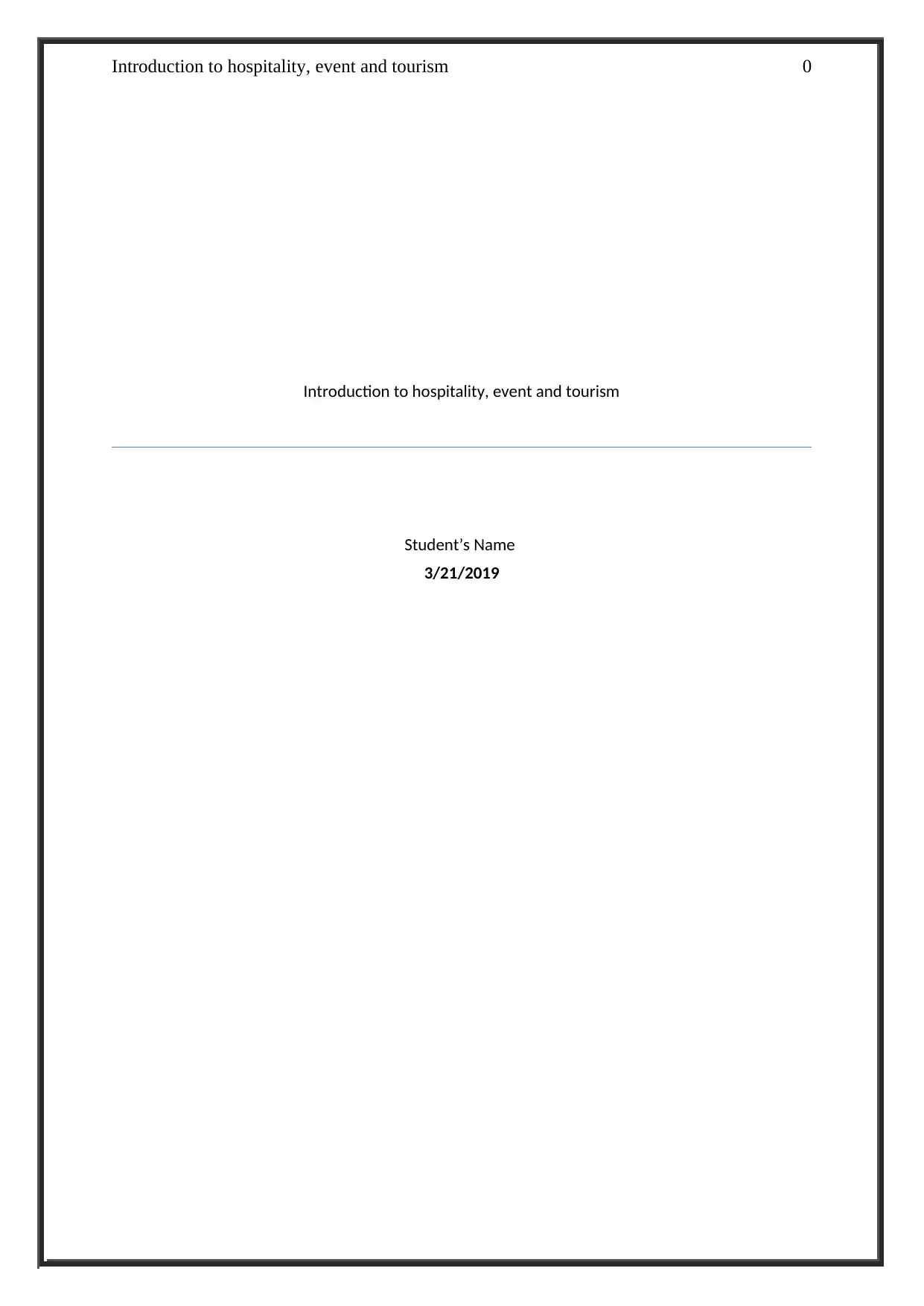
Introduction to hospitality, event and tourism 0
Introduction to hospitality, event and tourism
Student’s Name
3/21/2019
Introduction to hospitality, event and tourism
Student’s Name
3/21/2019
Paraphrase This Document
Need a fresh take? Get an instant paraphrase of this document with our AI Paraphraser
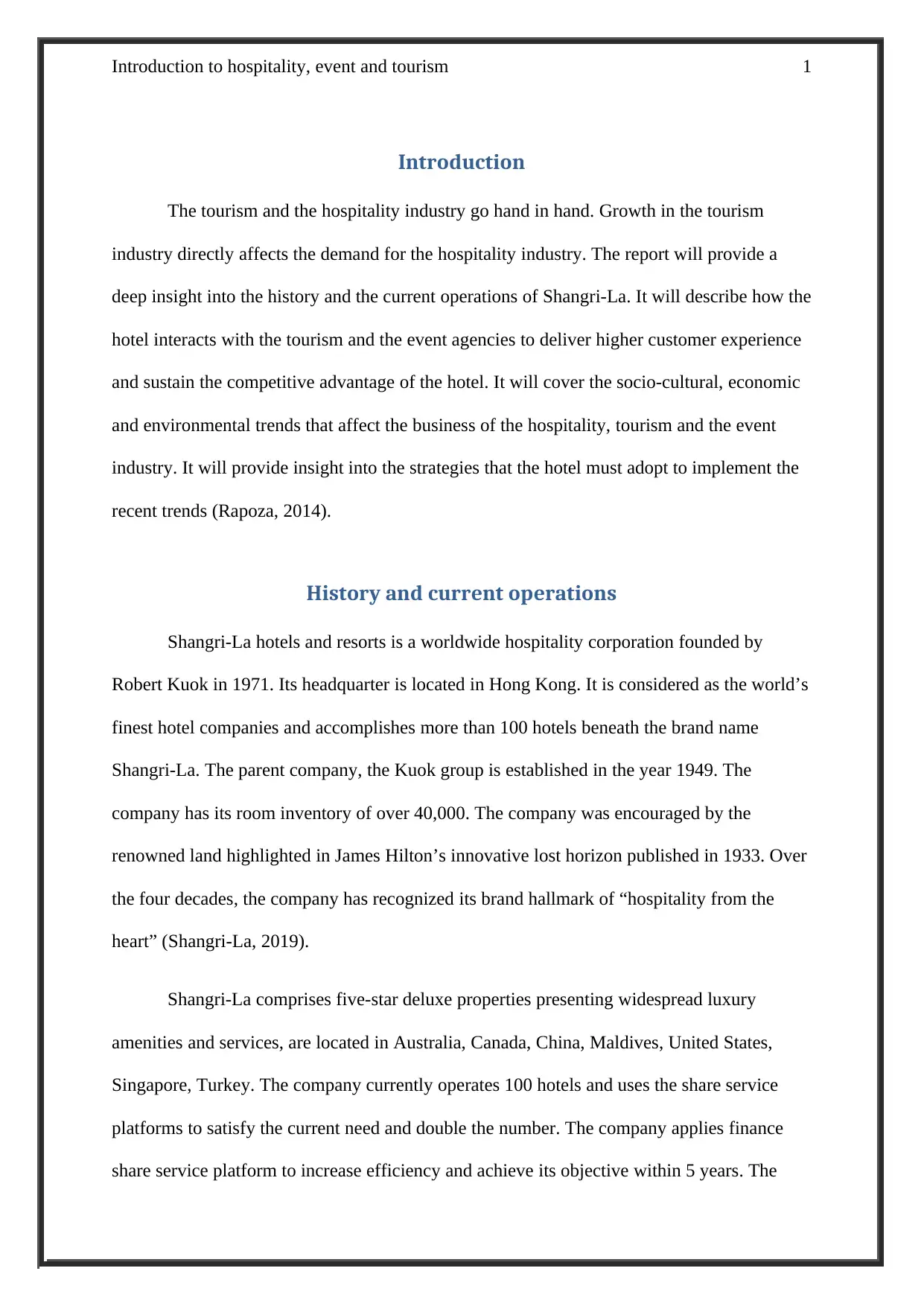
Introduction to hospitality, event and tourism 1
Introduction
The tourism and the hospitality industry go hand in hand. Growth in the tourism
industry directly affects the demand for the hospitality industry. The report will provide a
deep insight into the history and the current operations of Shangri-La. It will describe how the
hotel interacts with the tourism and the event agencies to deliver higher customer experience
and sustain the competitive advantage of the hotel. It will cover the socio-cultural, economic
and environmental trends that affect the business of the hospitality, tourism and the event
industry. It will provide insight into the strategies that the hotel must adopt to implement the
recent trends (Rapoza, 2014).
History and current operations
Shangri-La hotels and resorts is a worldwide hospitality corporation founded by
Robert Kuok in 1971. Its headquarter is located in Hong Kong. It is considered as the world’s
finest hotel companies and accomplishes more than 100 hotels beneath the brand name
Shangri-La. The parent company, the Kuok group is established in the year 1949. The
company has its room inventory of over 40,000. The company was encouraged by the
renowned land highlighted in James Hilton’s innovative lost horizon published in 1933. Over
the four decades, the company has recognized its brand hallmark of “hospitality from the
heart” (Shangri-La, 2019).
Shangri-La comprises five-star deluxe properties presenting widespread luxury
amenities and services, are located in Australia, Canada, China, Maldives, United States,
Singapore, Turkey. The company currently operates 100 hotels and uses the share service
platforms to satisfy the current need and double the number. The company applies finance
share service platform to increase efficiency and achieve its objective within 5 years. The
Introduction
The tourism and the hospitality industry go hand in hand. Growth in the tourism
industry directly affects the demand for the hospitality industry. The report will provide a
deep insight into the history and the current operations of Shangri-La. It will describe how the
hotel interacts with the tourism and the event agencies to deliver higher customer experience
and sustain the competitive advantage of the hotel. It will cover the socio-cultural, economic
and environmental trends that affect the business of the hospitality, tourism and the event
industry. It will provide insight into the strategies that the hotel must adopt to implement the
recent trends (Rapoza, 2014).
History and current operations
Shangri-La hotels and resorts is a worldwide hospitality corporation founded by
Robert Kuok in 1971. Its headquarter is located in Hong Kong. It is considered as the world’s
finest hotel companies and accomplishes more than 100 hotels beneath the brand name
Shangri-La. The parent company, the Kuok group is established in the year 1949. The
company has its room inventory of over 40,000. The company was encouraged by the
renowned land highlighted in James Hilton’s innovative lost horizon published in 1933. Over
the four decades, the company has recognized its brand hallmark of “hospitality from the
heart” (Shangri-La, 2019).
Shangri-La comprises five-star deluxe properties presenting widespread luxury
amenities and services, are located in Australia, Canada, China, Maldives, United States,
Singapore, Turkey. The company currently operates 100 hotels and uses the share service
platforms to satisfy the current need and double the number. The company applies finance
share service platform to increase efficiency and achieve its objective within 5 years. The
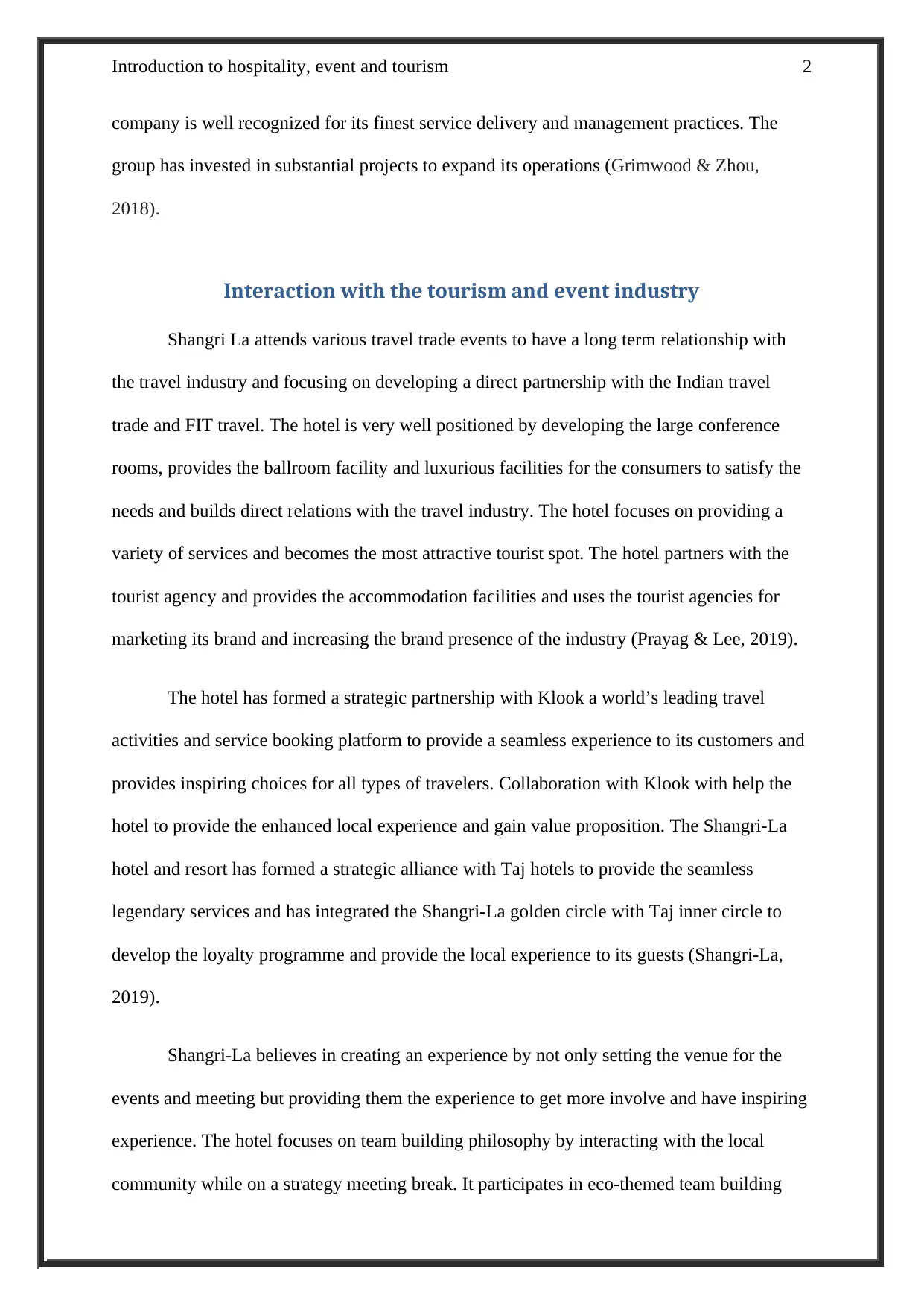
Introduction to hospitality, event and tourism 2
company is well recognized for its finest service delivery and management practices. The
group has invested in substantial projects to expand its operations (Grimwood & Zhou,
2018).
Interaction with the tourism and event industry
Shangri La attends various travel trade events to have a long term relationship with
the travel industry and focusing on developing a direct partnership with the Indian travel
trade and FIT travel. The hotel is very well positioned by developing the large conference
rooms, provides the ballroom facility and luxurious facilities for the consumers to satisfy the
needs and builds direct relations with the travel industry. The hotel focuses on providing a
variety of services and becomes the most attractive tourist spot. The hotel partners with the
tourist agency and provides the accommodation facilities and uses the tourist agencies for
marketing its brand and increasing the brand presence of the industry (Prayag & Lee, 2019).
The hotel has formed a strategic partnership with Klook a world’s leading travel
activities and service booking platform to provide a seamless experience to its customers and
provides inspiring choices for all types of travelers. Collaboration with Klook with help the
hotel to provide the enhanced local experience and gain value proposition. The Shangri-La
hotel and resort has formed a strategic alliance with Taj hotels to provide the seamless
legendary services and has integrated the Shangri-La golden circle with Taj inner circle to
develop the loyalty programme and provide the local experience to its guests (Shangri-La,
2019).
Shangri-La believes in creating an experience by not only setting the venue for the
events and meeting but providing them the experience to get more involve and have inspiring
experience. The hotel focuses on team building philosophy by interacting with the local
community while on a strategy meeting break. It participates in eco-themed team building
company is well recognized for its finest service delivery and management practices. The
group has invested in substantial projects to expand its operations (Grimwood & Zhou,
2018).
Interaction with the tourism and event industry
Shangri La attends various travel trade events to have a long term relationship with
the travel industry and focusing on developing a direct partnership with the Indian travel
trade and FIT travel. The hotel is very well positioned by developing the large conference
rooms, provides the ballroom facility and luxurious facilities for the consumers to satisfy the
needs and builds direct relations with the travel industry. The hotel focuses on providing a
variety of services and becomes the most attractive tourist spot. The hotel partners with the
tourist agency and provides the accommodation facilities and uses the tourist agencies for
marketing its brand and increasing the brand presence of the industry (Prayag & Lee, 2019).
The hotel has formed a strategic partnership with Klook a world’s leading travel
activities and service booking platform to provide a seamless experience to its customers and
provides inspiring choices for all types of travelers. Collaboration with Klook with help the
hotel to provide the enhanced local experience and gain value proposition. The Shangri-La
hotel and resort has formed a strategic alliance with Taj hotels to provide the seamless
legendary services and has integrated the Shangri-La golden circle with Taj inner circle to
develop the loyalty programme and provide the local experience to its guests (Shangri-La,
2019).
Shangri-La believes in creating an experience by not only setting the venue for the
events and meeting but providing them the experience to get more involve and have inspiring
experience. The hotel focuses on team building philosophy by interacting with the local
community while on a strategy meeting break. It participates in eco-themed team building
⊘ This is a preview!⊘
Do you want full access?
Subscribe today to unlock all pages.

Trusted by 1+ million students worldwide
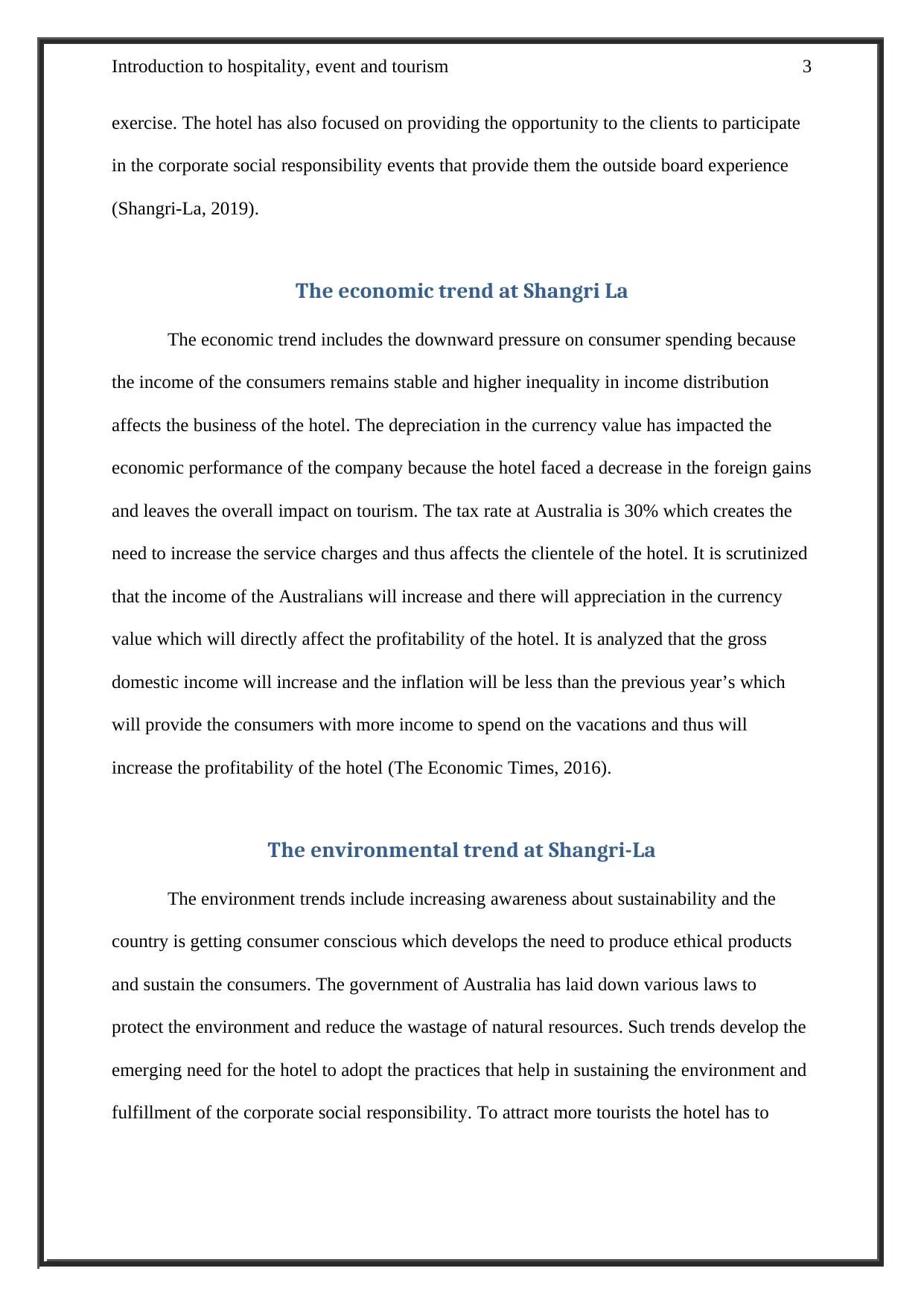
Introduction to hospitality, event and tourism 3
exercise. The hotel has also focused on providing the opportunity to the clients to participate
in the corporate social responsibility events that provide them the outside board experience
(Shangri-La, 2019).
The economic trend at Shangri La
The economic trend includes the downward pressure on consumer spending because
the income of the consumers remains stable and higher inequality in income distribution
affects the business of the hotel. The depreciation in the currency value has impacted the
economic performance of the company because the hotel faced a decrease in the foreign gains
and leaves the overall impact on tourism. The tax rate at Australia is 30% which creates the
need to increase the service charges and thus affects the clientele of the hotel. It is scrutinized
that the income of the Australians will increase and there will appreciation in the currency
value which will directly affect the profitability of the hotel. It is analyzed that the gross
domestic income will increase and the inflation will be less than the previous year’s which
will provide the consumers with more income to spend on the vacations and thus will
increase the profitability of the hotel (The Economic Times, 2016).
The environmental trend at Shangri-La
The environment trends include increasing awareness about sustainability and the
country is getting consumer conscious which develops the need to produce ethical products
and sustain the consumers. The government of Australia has laid down various laws to
protect the environment and reduce the wastage of natural resources. Such trends develop the
emerging need for the hotel to adopt the practices that help in sustaining the environment and
fulfillment of the corporate social responsibility. To attract more tourists the hotel has to
exercise. The hotel has also focused on providing the opportunity to the clients to participate
in the corporate social responsibility events that provide them the outside board experience
(Shangri-La, 2019).
The economic trend at Shangri La
The economic trend includes the downward pressure on consumer spending because
the income of the consumers remains stable and higher inequality in income distribution
affects the business of the hotel. The depreciation in the currency value has impacted the
economic performance of the company because the hotel faced a decrease in the foreign gains
and leaves the overall impact on tourism. The tax rate at Australia is 30% which creates the
need to increase the service charges and thus affects the clientele of the hotel. It is scrutinized
that the income of the Australians will increase and there will appreciation in the currency
value which will directly affect the profitability of the hotel. It is analyzed that the gross
domestic income will increase and the inflation will be less than the previous year’s which
will provide the consumers with more income to spend on the vacations and thus will
increase the profitability of the hotel (The Economic Times, 2016).
The environmental trend at Shangri-La
The environment trends include increasing awareness about sustainability and the
country is getting consumer conscious which develops the need to produce ethical products
and sustain the consumers. The government of Australia has laid down various laws to
protect the environment and reduce the wastage of natural resources. Such trends develop the
emerging need for the hotel to adopt the practices that help in sustaining the environment and
fulfillment of the corporate social responsibility. To attract more tourists the hotel has to
Paraphrase This Document
Need a fresh take? Get an instant paraphrase of this document with our AI Paraphraser
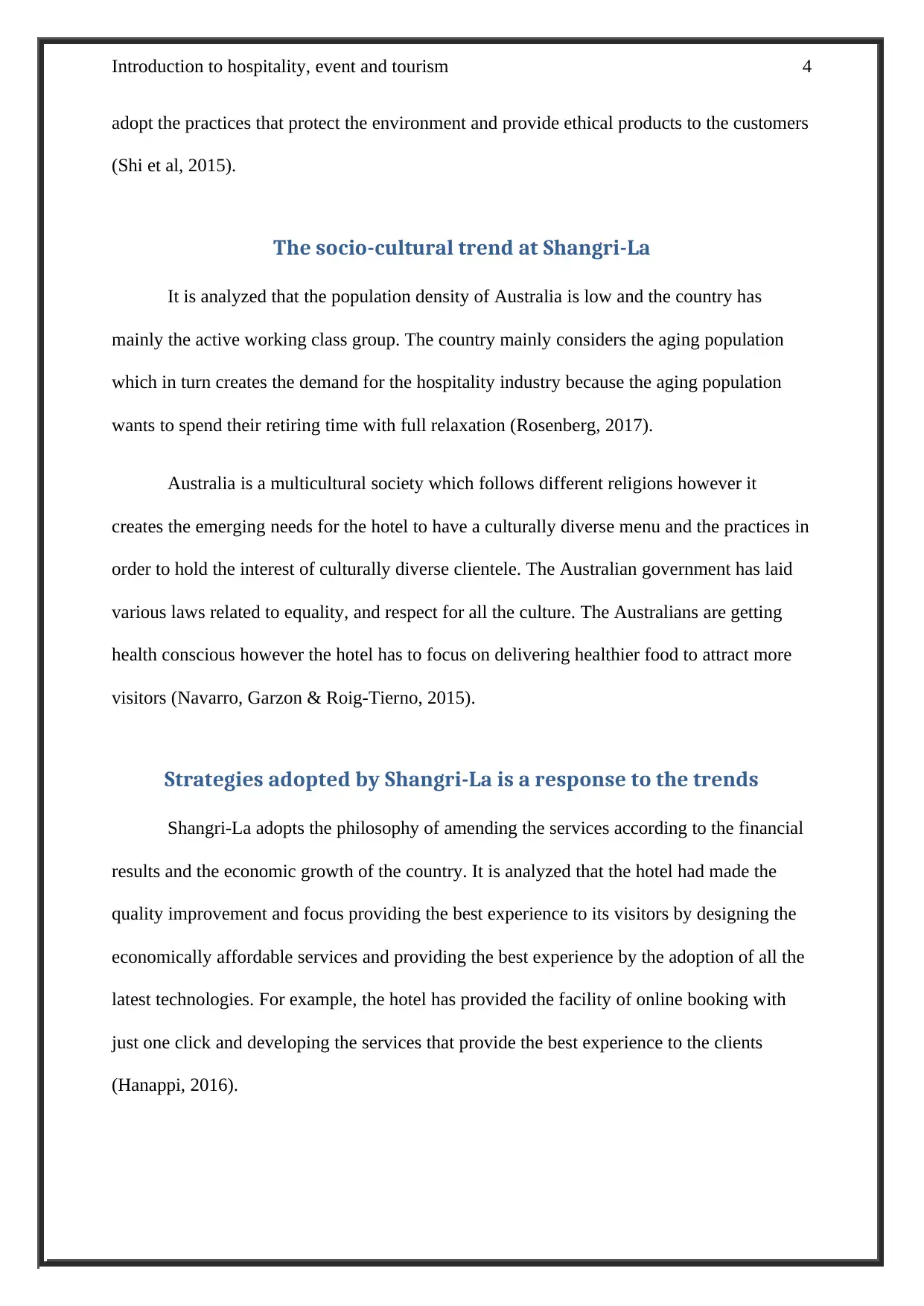
Introduction to hospitality, event and tourism 4
adopt the practices that protect the environment and provide ethical products to the customers
(Shi et al, 2015).
The socio-cultural trend at Shangri-La
It is analyzed that the population density of Australia is low and the country has
mainly the active working class group. The country mainly considers the aging population
which in turn creates the demand for the hospitality industry because the aging population
wants to spend their retiring time with full relaxation (Rosenberg, 2017).
Australia is a multicultural society which follows different religions however it
creates the emerging needs for the hotel to have a culturally diverse menu and the practices in
order to hold the interest of culturally diverse clientele. The Australian government has laid
various laws related to equality, and respect for all the culture. The Australians are getting
health conscious however the hotel has to focus on delivering healthier food to attract more
visitors (Navarro, Garzon & Roig-Tierno, 2015).
Strategies adopted by Shangri-La is a response to the trends
Shangri-La adopts the philosophy of amending the services according to the financial
results and the economic growth of the country. It is analyzed that the hotel had made the
quality improvement and focus providing the best experience to its visitors by designing the
economically affordable services and providing the best experience by the adoption of all the
latest technologies. For example, the hotel has provided the facility of online booking with
just one click and developing the services that provide the best experience to the clients
(Hanappi, 2016).
adopt the practices that protect the environment and provide ethical products to the customers
(Shi et al, 2015).
The socio-cultural trend at Shangri-La
It is analyzed that the population density of Australia is low and the country has
mainly the active working class group. The country mainly considers the aging population
which in turn creates the demand for the hospitality industry because the aging population
wants to spend their retiring time with full relaxation (Rosenberg, 2017).
Australia is a multicultural society which follows different religions however it
creates the emerging needs for the hotel to have a culturally diverse menu and the practices in
order to hold the interest of culturally diverse clientele. The Australian government has laid
various laws related to equality, and respect for all the culture. The Australians are getting
health conscious however the hotel has to focus on delivering healthier food to attract more
visitors (Navarro, Garzon & Roig-Tierno, 2015).
Strategies adopted by Shangri-La is a response to the trends
Shangri-La adopts the philosophy of amending the services according to the financial
results and the economic growth of the country. It is analyzed that the hotel had made the
quality improvement and focus providing the best experience to its visitors by designing the
economically affordable services and providing the best experience by the adoption of all the
latest technologies. For example, the hotel has provided the facility of online booking with
just one click and developing the services that provide the best experience to the clients
(Hanappi, 2016).
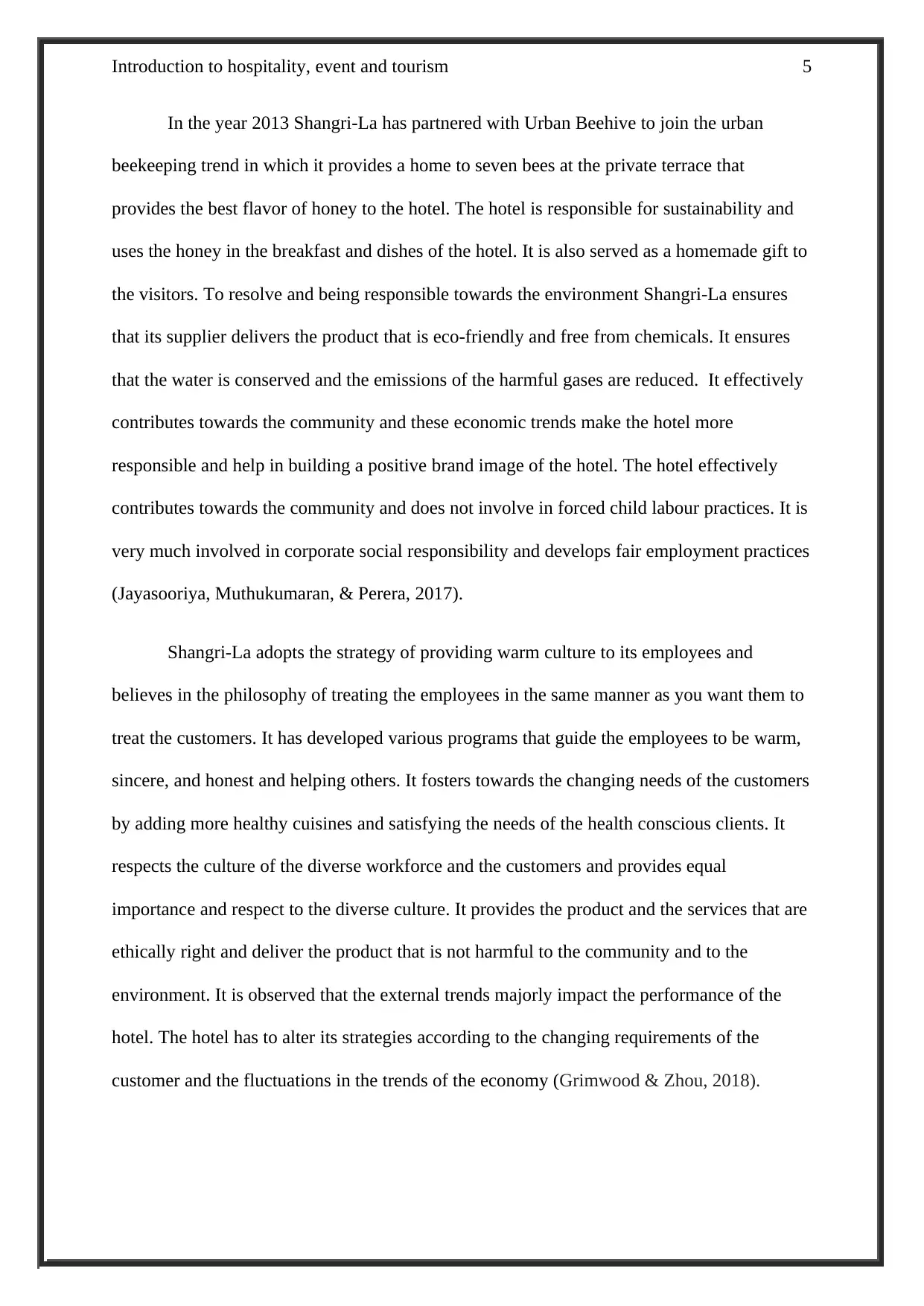
Introduction to hospitality, event and tourism 5
In the year 2013 Shangri-La has partnered with Urban Beehive to join the urban
beekeeping trend in which it provides a home to seven bees at the private terrace that
provides the best flavor of honey to the hotel. The hotel is responsible for sustainability and
uses the honey in the breakfast and dishes of the hotel. It is also served as a homemade gift to
the visitors. To resolve and being responsible towards the environment Shangri-La ensures
that its supplier delivers the product that is eco-friendly and free from chemicals. It ensures
that the water is conserved and the emissions of the harmful gases are reduced. It effectively
contributes towards the community and these economic trends make the hotel more
responsible and help in building a positive brand image of the hotel. The hotel effectively
contributes towards the community and does not involve in forced child labour practices. It is
very much involved in corporate social responsibility and develops fair employment practices
(Jayasooriya, Muthukumaran, & Perera, 2017).
Shangri-La adopts the strategy of providing warm culture to its employees and
believes in the philosophy of treating the employees in the same manner as you want them to
treat the customers. It has developed various programs that guide the employees to be warm,
sincere, and honest and helping others. It fosters towards the changing needs of the customers
by adding more healthy cuisines and satisfying the needs of the health conscious clients. It
respects the culture of the diverse workforce and the customers and provides equal
importance and respect to the diverse culture. It provides the product and the services that are
ethically right and deliver the product that is not harmful to the community and to the
environment. It is observed that the external trends majorly impact the performance of the
hotel. The hotel has to alter its strategies according to the changing requirements of the
customer and the fluctuations in the trends of the economy (Grimwood & Zhou, 2018).
In the year 2013 Shangri-La has partnered with Urban Beehive to join the urban
beekeeping trend in which it provides a home to seven bees at the private terrace that
provides the best flavor of honey to the hotel. The hotel is responsible for sustainability and
uses the honey in the breakfast and dishes of the hotel. It is also served as a homemade gift to
the visitors. To resolve and being responsible towards the environment Shangri-La ensures
that its supplier delivers the product that is eco-friendly and free from chemicals. It ensures
that the water is conserved and the emissions of the harmful gases are reduced. It effectively
contributes towards the community and these economic trends make the hotel more
responsible and help in building a positive brand image of the hotel. The hotel effectively
contributes towards the community and does not involve in forced child labour practices. It is
very much involved in corporate social responsibility and develops fair employment practices
(Jayasooriya, Muthukumaran, & Perera, 2017).
Shangri-La adopts the strategy of providing warm culture to its employees and
believes in the philosophy of treating the employees in the same manner as you want them to
treat the customers. It has developed various programs that guide the employees to be warm,
sincere, and honest and helping others. It fosters towards the changing needs of the customers
by adding more healthy cuisines and satisfying the needs of the health conscious clients. It
respects the culture of the diverse workforce and the customers and provides equal
importance and respect to the diverse culture. It provides the product and the services that are
ethically right and deliver the product that is not harmful to the community and to the
environment. It is observed that the external trends majorly impact the performance of the
hotel. The hotel has to alter its strategies according to the changing requirements of the
customer and the fluctuations in the trends of the economy (Grimwood & Zhou, 2018).
⊘ This is a preview!⊘
Do you want full access?
Subscribe today to unlock all pages.

Trusted by 1+ million students worldwide
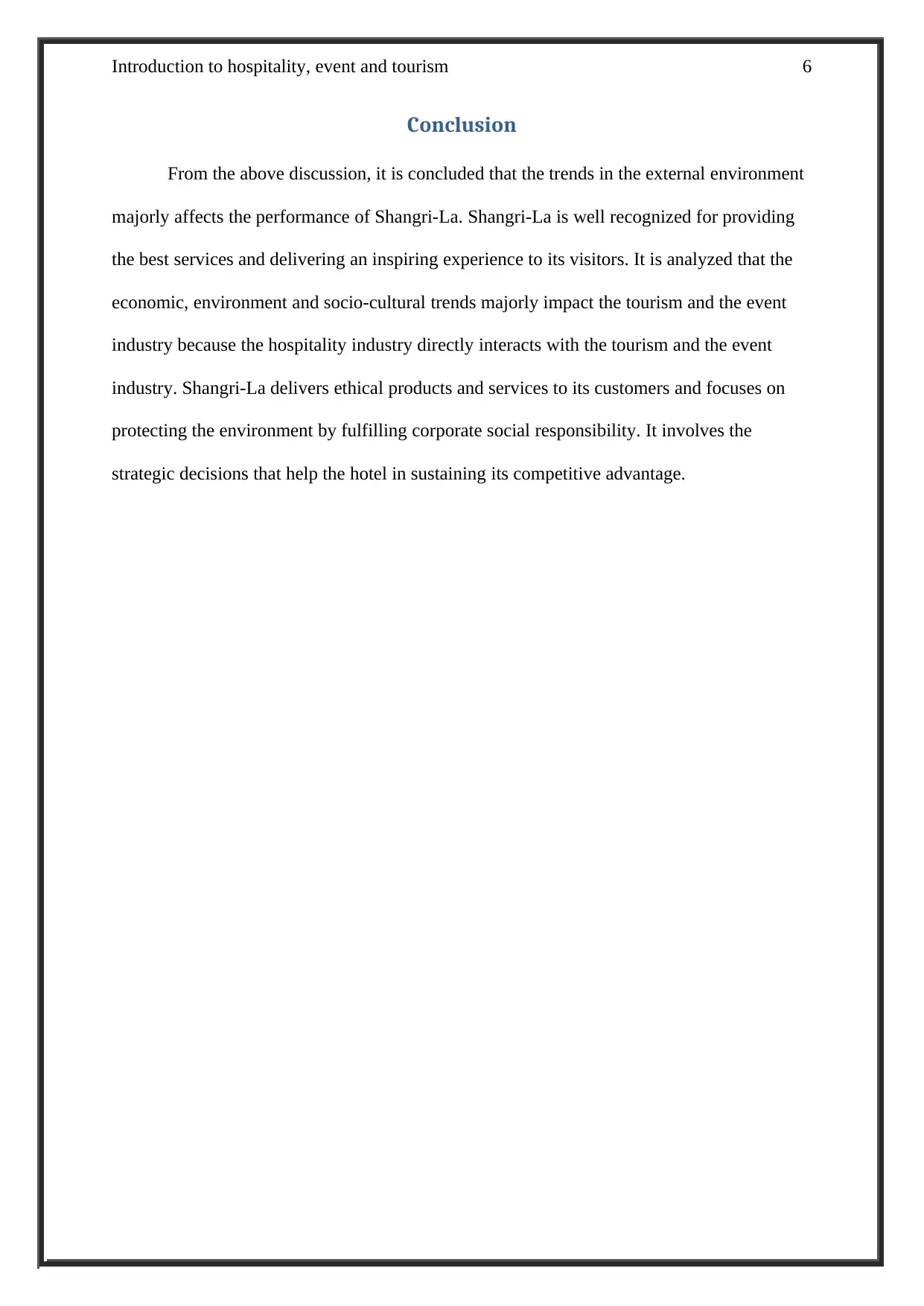
Introduction to hospitality, event and tourism 6
Conclusion
From the above discussion, it is concluded that the trends in the external environment
majorly affects the performance of Shangri-La. Shangri-La is well recognized for providing
the best services and delivering an inspiring experience to its visitors. It is analyzed that the
economic, environment and socio-cultural trends majorly impact the tourism and the event
industry because the hospitality industry directly interacts with the tourism and the event
industry. Shangri-La delivers ethical products and services to its customers and focuses on
protecting the environment by fulfilling corporate social responsibility. It involves the
strategic decisions that help the hotel in sustaining its competitive advantage.
Conclusion
From the above discussion, it is concluded that the trends in the external environment
majorly affects the performance of Shangri-La. Shangri-La is well recognized for providing
the best services and delivering an inspiring experience to its visitors. It is analyzed that the
economic, environment and socio-cultural trends majorly impact the tourism and the event
industry because the hospitality industry directly interacts with the tourism and the event
industry. Shangri-La delivers ethical products and services to its customers and focuses on
protecting the environment by fulfilling corporate social responsibility. It involves the
strategic decisions that help the hotel in sustaining its competitive advantage.
Paraphrase This Document
Need a fresh take? Get an instant paraphrase of this document with our AI Paraphraser
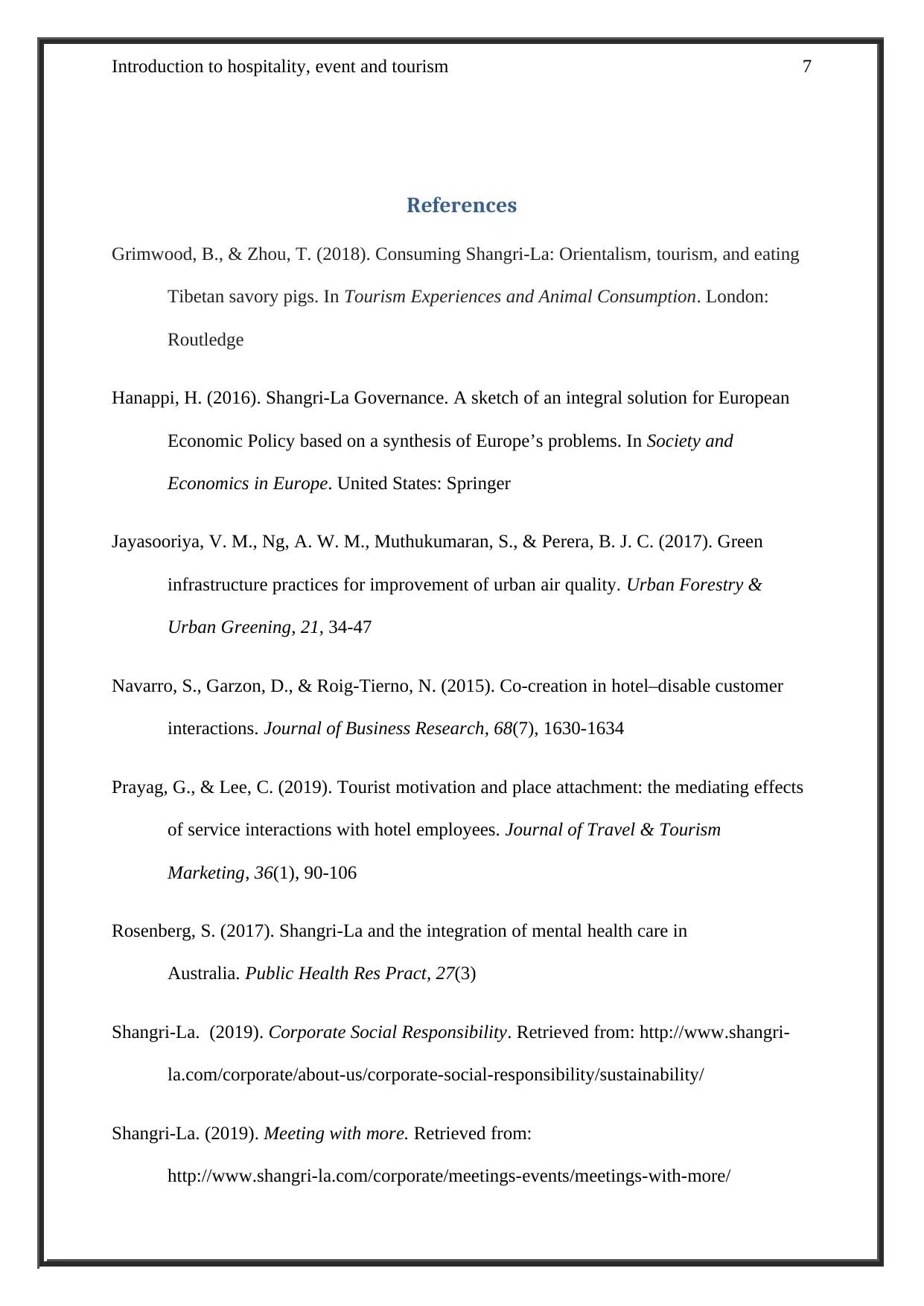
Introduction to hospitality, event and tourism 7
References
Grimwood, B., & Zhou, T. (2018). Consuming Shangri-La: Orientalism, tourism, and eating
Tibetan savory pigs. In Tourism Experiences and Animal Consumption. London:
Routledge
Hanappi, H. (2016). Shangri-La Governance. A sketch of an integral solution for European
Economic Policy based on a synthesis of Europe’s problems. In Society and
Economics in Europe. United States: Springer
Jayasooriya, V. M., Ng, A. W. M., Muthukumaran, S., & Perera, B. J. C. (2017). Green
infrastructure practices for improvement of urban air quality. Urban Forestry &
Urban Greening, 21, 34-47
Navarro, S., Garzon, D., & Roig-Tierno, N. (2015). Co-creation in hotel–disable customer
interactions. Journal of Business Research, 68(7), 1630-1634
Prayag, G., & Lee, C. (2019). Tourist motivation and place attachment: the mediating effects
of service interactions with hotel employees. Journal of Travel & Tourism
Marketing, 36(1), 90-106
Rosenberg, S. (2017). Shangri-La and the integration of mental health care in
Australia. Public Health Res Pract, 27(3)
Shangri-La. (2019). Corporate Social Responsibility. Retrieved from: http://www.shangri-
la.com/corporate/about-us/corporate-social-responsibility/sustainability/
Shangri-La. (2019). Meeting with more. Retrieved from:
http://www.shangri-la.com/corporate/meetings-events/meetings-with-more/
References
Grimwood, B., & Zhou, T. (2018). Consuming Shangri-La: Orientalism, tourism, and eating
Tibetan savory pigs. In Tourism Experiences and Animal Consumption. London:
Routledge
Hanappi, H. (2016). Shangri-La Governance. A sketch of an integral solution for European
Economic Policy based on a synthesis of Europe’s problems. In Society and
Economics in Europe. United States: Springer
Jayasooriya, V. M., Ng, A. W. M., Muthukumaran, S., & Perera, B. J. C. (2017). Green
infrastructure practices for improvement of urban air quality. Urban Forestry &
Urban Greening, 21, 34-47
Navarro, S., Garzon, D., & Roig-Tierno, N. (2015). Co-creation in hotel–disable customer
interactions. Journal of Business Research, 68(7), 1630-1634
Prayag, G., & Lee, C. (2019). Tourist motivation and place attachment: the mediating effects
of service interactions with hotel employees. Journal of Travel & Tourism
Marketing, 36(1), 90-106
Rosenberg, S. (2017). Shangri-La and the integration of mental health care in
Australia. Public Health Res Pract, 27(3)
Shangri-La. (2019). Corporate Social Responsibility. Retrieved from: http://www.shangri-
la.com/corporate/about-us/corporate-social-responsibility/sustainability/
Shangri-La. (2019). Meeting with more. Retrieved from:
http://www.shangri-la.com/corporate/meetings-events/meetings-with-more/
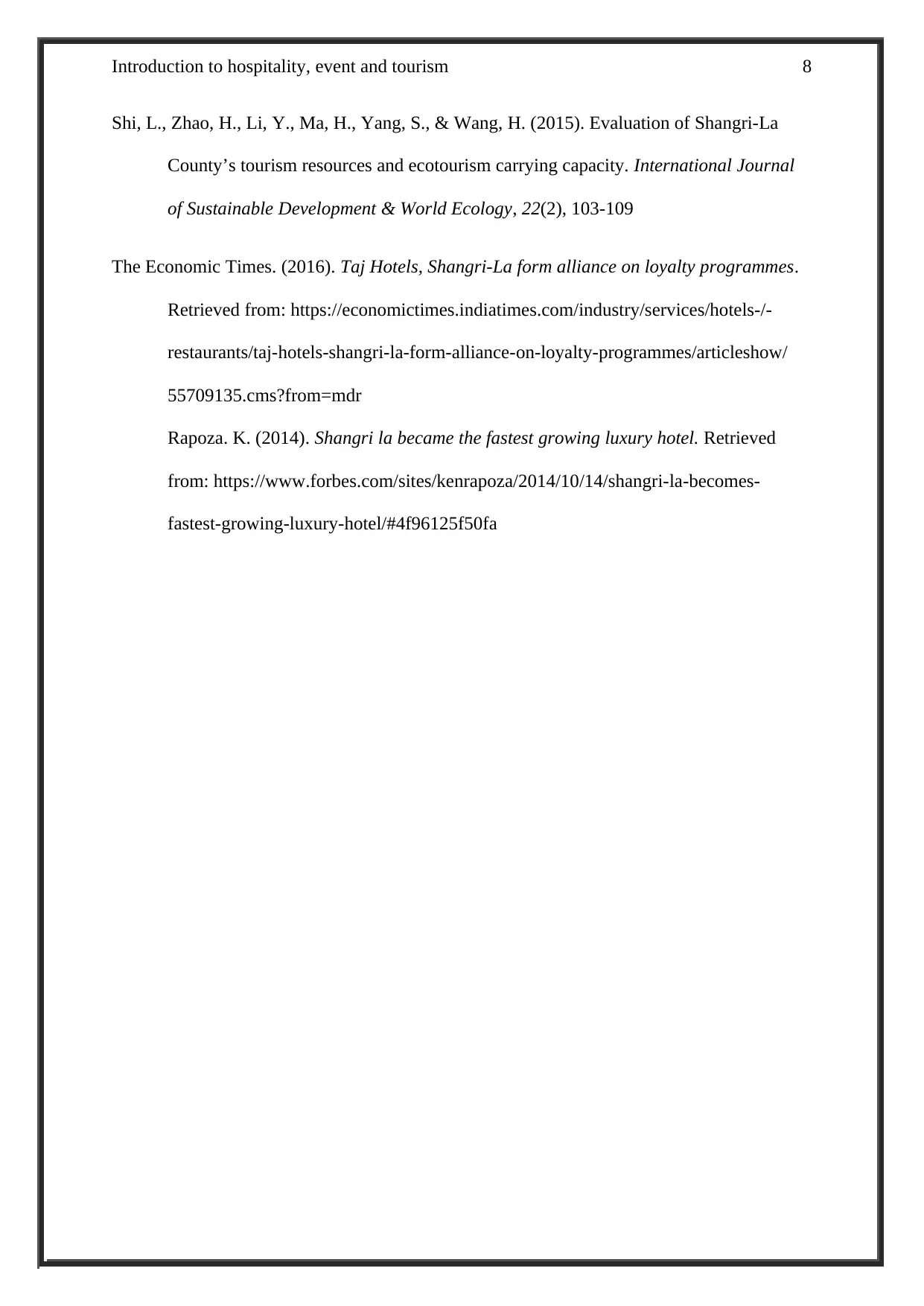
Introduction to hospitality, event and tourism 8
Shi, L., Zhao, H., Li, Y., Ma, H., Yang, S., & Wang, H. (2015). Evaluation of Shangri-La
County’s tourism resources and ecotourism carrying capacity. International Journal
of Sustainable Development & World Ecology, 22(2), 103-109
The Economic Times. (2016). Taj Hotels, Shangri-La form alliance on loyalty programmes.
Retrieved from: https://economictimes.indiatimes.com/industry/services/hotels-/-
restaurants/taj-hotels-shangri-la-form-alliance-on-loyalty-programmes/articleshow/
55709135.cms?from=mdr
Rapoza. K. (2014). Shangri la became the fastest growing luxury hotel. Retrieved
from: https://www.forbes.com/sites/kenrapoza/2014/10/14/shangri-la-becomes-
fastest-growing-luxury-hotel/#4f96125f50fa
Shi, L., Zhao, H., Li, Y., Ma, H., Yang, S., & Wang, H. (2015). Evaluation of Shangri-La
County’s tourism resources and ecotourism carrying capacity. International Journal
of Sustainable Development & World Ecology, 22(2), 103-109
The Economic Times. (2016). Taj Hotels, Shangri-La form alliance on loyalty programmes.
Retrieved from: https://economictimes.indiatimes.com/industry/services/hotels-/-
restaurants/taj-hotels-shangri-la-form-alliance-on-loyalty-programmes/articleshow/
55709135.cms?from=mdr
Rapoza. K. (2014). Shangri la became the fastest growing luxury hotel. Retrieved
from: https://www.forbes.com/sites/kenrapoza/2014/10/14/shangri-la-becomes-
fastest-growing-luxury-hotel/#4f96125f50fa
⊘ This is a preview!⊘
Do you want full access?
Subscribe today to unlock all pages.

Trusted by 1+ million students worldwide
1 out of 9
Related Documents
Your All-in-One AI-Powered Toolkit for Academic Success.
+13062052269
info@desklib.com
Available 24*7 on WhatsApp / Email
![[object Object]](/_next/static/media/star-bottom.7253800d.svg)
Unlock your academic potential
Copyright © 2020–2026 A2Z Services. All Rights Reserved. Developed and managed by ZUCOL.



